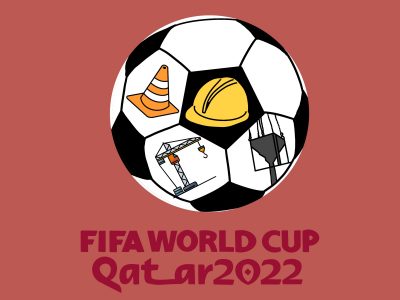The 2022 FIFA World Cup began on Nov. 20 and will end on Dec. 18. The soccer tradition brings teams from every country to compete, with one emerging champion at the cup’s conclusion.
Sadly enough, however, for fans across the world, the deafening roars of the stadium and thrilling dribble of the ball have been muted — replaced by calls of action from activists everywhere, rightfully concerned about the country who was chosen to host: Qatar.
A not so brief history of the country’s path to the 2022 World Cup demonstrates a sinister cost paid purely for bragging rights.
Qatar was the subject of heavy scrutiny when it surfaced that the workers they’d hired to build the seven new stadiums needed for the cup weren’t being fairly paid.
Qatar utilized ‘kafala,’ a sponsorship-based employment system to hire migrant laborers. However, this system also allowed employers nearly total control of the workers — preventing them from quitting, subjecting them to abusive treatment and encouraging frequent wage theft, with little being done to protect them.
Over 6,500 migrant workers died so Qatar could make themselves a household name. A search for fame quickly turned deadly.
Employing slave labor and building seven stadiums seems to suggest an unpreparedness that no amount of planning could resolve. One might question why they were allowed to host the event in the first place.
The answer is simple — they weren’t.

Qatar’s original bid for the cup was secured thanks to corruption within FIFA. It’s since been proven that Qatar being chosen to host as well as Russia being chosen for the 2018 world cup were products of the respective countries bribing FIFA officials.
Why would a country with a population of just three million be desperate to host an event which typically draws about three million fans? The obvious economic benefits aside, undertaking such a headache to sponsor a big soccer tournament seems excessive and frankly unnecessary — why open yourself up to probing eyes and contrasting cultures?
Well, because sports symbolizes a larger ideology many can’t immediately grasp.
Sporting events like the World Cup or the Olympics offer an opportunity to put your country on the map. Suddenly Qatar, the 37th smallest country in the world, has what every miniature nation seeks — relevance.
Qatar hoped to validate itself amongst giants like the United States and Russia. The ability to put your name on the FIFA World Cup, the cumulative tournament for the most popular sport in the world, is a sign of power, of importance — with such great stakes Qatar’s motivation to host by any means necessary is clarified.
Criticizing Qatar becomes slightly more complicated, however when realizing some of the attitudes directed toward the country have intolerable undertones, such as many being frustrated at the ban on alcohol sales at the stadium, given that Qatar is a Muslim nation.
The FIFA President Gianni Infantino voiced similar concerns in conjunction to activists who felt the past human rights violations should’ve immediately disqualified Qatar from hosting.
Infantino felt the backlash was hypocritical, stating “For what we Europeans have been doing around the world in the last 3,000 years, we should be apologizing for the next 3,000 years before starting to give moral lessons to people.”
However this fails to acknowledge the present day nature of Qatar’s actions. While refusing to sell beer shouldn’t be the main concern for fans — tolerance should extend both ways. Security guards at the cup allegedly stopped fans who wore rainbow armbands from entering, an example of the country’s anti-LGBTQ+ policies.
Though many may cite this as a time for fans to boycott the cup and inspire the people in charge to choose countries more deserving of hosting — the true responsibility lies with FIFA.
Realistically, people will play and watch soccer regardless of where the cup is hosted. FIFA is the source that needs to be held accountable. Rather than taking a pay day to benefit their personal interests, those in charge should vote on World Cup host countries based on whose best equipped to take on the job, both in terms of infrastructure and morality.
The World Cup comes around once every four years — money might be a priority, but avoiding human rights violations shouldn’t be some perilous task, it should be the standard.
This editorial was written by Opinion Editor Lydia Evans.






















































































































ryan • Dec 6, 2022 at 10:22 am
how does have anything to do with the fifa world cup